Wayne C. Allen's Blog, page 27
June 3, 2017
What Commitment Looks Like
This is post 2 of 2 in the series “Commitment in Relationships”
What Commitment Looks Like–we continue our look at the actions necessary for a relationship to thrive

Last issue, I proposed the following “commitments” that make for an excellent relationship:
• I can only commit to an action — to something I will do.
• I commit to being in relationship with you. Here is what I commit to:
• I will be open, honest and vulnerable in my daily communication with you.
• I will tell you, today, who I am and what I am thinking.
• I will tell you, today, everything I have done, and what it meant to me.
• I will listen to you with curiosity and interest, today.
• I will accept that you are who you are today, and will integrate who you are today with my picture of you from “yesterday.”
• I will make myself fully available and present to and with you, today, and engage in clear and concise communication with you for not less than 30 minutes, today.
• I will own all of my thoughts, feelings, emotions and interpretations, working to take full responsibility for each and every one of them. If I slip and go into blaming, I will stop myself, apologise, and return to self-responsibility.
• I will actively encourage you to listen to me and to actively hold me to the performance of what I have committed to.
• I will commit to all of these things, without any expectation of anything from you, as all I can ever commit to is to what I can and will do.
Last issue I wrote about commitment. I drew portions of what I wrote from my excellent relationship book, The. Best. Relationship. Ever. I decided to expand a bit on the items on the list, above.
Let’s begin by talking about one of my favourite words –integrity.
As usual, I’ll provide a definition:
Integrity (noun)
Definitions:
1. possession of firm principles: the quality of possessing and steadfastly adhering to high moral principles or professional standards
2. completeness: the state of being complete or undivided
3. wholeness: the state of being sound or undamaged
from: Encarta
Reading the first definition is an exercise in futility; we must ask: what are high moral principles? The answer depends upon whom you ask. So when I describe integrity, I provide an example.
“Integrity, for me, is demonstrated by how I act.
For example, “My word is my bond” is one of my integrity statements.
As a statement, it means nothing. It just sounds good.
The proof is this: I say I will do something, and then I do it, without excuse or equivocation.
Now, notice I did not say that my integrity is dependent upon the behaviour of others. My integrity is a characteristic of me and my behaviour, and only that.
So, how does this fit in with the list I proposed? I hope it’s obvious. Here’s the first statement:
I can only commit to an action — to something I will do.
Many are notorious for trying to escape responsibility for their actions and the results they get from those actions. Our culture teaches us to blame others when things go wrong — for example, blaming the teacher for your kid’s bad grades. And most people are unwilling to make anything other than conditional commitments. “I’ll do this if you will do that, and you get to go first, of course.”
Where this goes off the rails is when I think that I “should” be able to demand what another person is permitted to do in relation to me. It’s as if I think that my opinion ought to dictate another’s behaviour. This is faulty logic.
It’s a variation on an old theme – “If you love me, you’ll behave the way I want you to, so that I don’t have any conflicts or have to work at this.”
When such statements are made, they demonstrate nothing more than a complete lack of integrity.
You are never going to meet one person who will do everything you want them to, act exactly the way you want them to, or treat you exactly as you want to be treated. On the other hand, what you can have, all the time, is a life of integrity: where the way you act matches what you say you will do.
You’ll notice that all the principles at the top of this article are statements of what “I” will do.
My level of integrity is solely determined by how and whether I live up to what I have committed to.
This is not the same as being judged for not living up to something someone else wants me to do. I am not obligated to do something just because someone wants me to. I am obligated if I agree. It’s just that simple.
So, I hear you asking, what do I do when someone promises me something and then fails to deliver? This is a good question.
I plan for such eventualities by having stated what I will do if there is an “agreement failure.” In other words, in my, case, my response would be to simply point out the “agreement failure,” and then to ask the other person to enter into dialogue.
Let’s propose a statement that has integrity: “I will always tell you the truth about me. This is so important to me that if you lie to me, I will leave.”
This is diametrically the opposite of, “If you love me, you will not lie to me,” or “I’ll stop lying when you stop lying,” or “Don’t you know you shouldn’t lie.”
Some people would argue that the example statement, above, is a threat. It is not. It is a statement of:
what I will do about telling the truth, and
what I will do if you lie to me.
In a sense, the statement is not about “you” at all. You can do whatever you want to (about, in this case, lying) and I am clear with you what I will do if you lie to me.
In other words, lying has consequences.
This is different from erroneous boundary setting, which typically is a variant of, “You are not allowed to lie to me,” or, “If you love me you won’t lie to me,” or, “You can’t treat me that way.” Anyone can treat you any way they treat you. Your choice is always limited to what you will or will not do in response.
Most people wimp out right here. I hear a lot of, “You do that again and I’m leaving,” and whatever it is happens again, and the person does not leave. This is a monumental lack of integrity on the part of the “threatener.” Threats are stupid and childish. If I say I will do something, I do it. This is not a threat. It’s a consequence.
I do what I say I will do. No excuses. No wiggling out of it. No trying desperately to make it the fault of the other person.
This is Integrity.
Get this: a loving relationship is not one in which another person does what you want them to on command, is not one in which the other person puts you first, is not one in which everything is a contest and everyone is keeping score.
A loving relationship is one where mutual respect and honesty is played out in integrity and forthrightness. No games, no manipulation, no trying to force the other person into a mold of your making.
You are either in the relationship wholeheartedly and unreservedly, or you are gone. No half-hearted, conditional commitments.
Being an adult (and god, there are so few of them) means being a person of integrity. Plain and simple.
The post What Commitment Looks Like appeared first on The Pathless Path.
Original article: What Commitment Looks Like.
May 27, 2017
Creating and Maintaining Relationships that Work
Creating and Maintaining Relationships that Work — relationships that work don’t just happen. You have to commit to making them work.
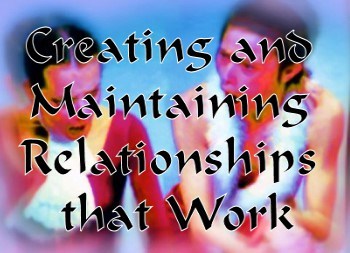
It’s amazing how often, when we’re talking with other couples, the conversation turns to relationships and relating. As you likely know, I’ve written a couple of books about this topic. (see: The. Best. Relationship. Ever.)
Just the other day I was talking about commitment.
I said,
“In successful relationships, people do not commit to each other.
They commit to a way of being and relating.”
Or,
“We commit to a verb, not a noun.”
I did a Thesaurus.com search on “commit.” Here’s one section:
Synonyms: accept, adopt, appoint, call for, cast, co-opt, commit oneself, crave, cull, decide on, designate, desire, determine, discriminate between, draw lots, elect, embrace, espouse, excerpt, extract, fancy, favor, finger, fix on, glean, judge, love, make choice, make decision, name, opt for, predestine, prefer, see fit, separate, set aside, settle upon, sift out, single out, slot, sort, tab, tag, take, take up, tap, want, weigh, will, winnow, wish, wish for
Antonyms: decline, forgo, refuse, reject, spurn
Source: Roget’s New Millennium™ Thesaurus, First Edition (v 1.1.1) Copyright © 2005 by Lexico Publishing Group, LLC. All rights reserved.
To commit, then, is to opt-in; to select something. Now, you may be saying, “Yeah. And I chose him or her as my life-partner. What’s wrong with that?” And I would reply, “Nothing, other than that it won’t work.”
This is a normal mis-perception. It’s one of many inside / outside confusions. The only thing I can know is myself, and even that task is never perfectly accomplished.
I can commit, then, only to what I am in direct control of. In other words, I can only commit to what I will do.
Misunderstanding what I can control and what i cannot is what gets us into trouble. Whenever I commit to an external anything, I make a fundamental mistake. The mistake is this: I am actually committing to my present view of the thing I am committing to, which means I am in deep trouble when that external thing changes.
And change it will. I can safely say that the biggest cause of relationship discord is the disenchantment that comes when the object of our affection “changes.”

Let’s create Dick and Jane, and work from Dick’s side of things.
Dick meets Jane, they strike up a conversation, and they decide they like each other. They decide to date.
Now, as soon as they met, each began to create a data file. For Dick, there is a “Jane file,” and it’s filled with bits of data. Initially, he filled it with “enchanting” bits: for example, hormonally driven data about her appearance, smell, what she wears, how she sounds. Let’s call this data, “All the things about Jane that I turn myself on about.”
As time goes by, biographical data is added, as are “likes and dislikes.” Sexual preferences are added as they occur. Safe topics, unsafe topics are added to “do and don’t” lists.
This adding process goes on, not only when Dick and Jane are together, but perhaps more importantly, when Jane is absent. It is during the absences, especially, that Dick attaches meaning to the bits of data in his “Jane” file.
It’s, “Hmm. In the middle of the meal, right after I talked about baseball, Jane got a pained look on her face. She must hate baseball.” Dick inserts “Do not talk about baseball” in the “don’t” file.
Hopefully, you see the problem emerging. THE interpretation Dick made has absolutely nothing to do with Jane.
All Dick knows for sure is that an expression came over Jane’s face during a conversation about baseball. All the rest is Dick, making guesses, without checking with Jane.
And here’s the weird part. All of the data collected about Jane is also completely about Dick. (In other words, Dick doesn’t know dick about Jane…)
This is where I lose most people, so stick with me.
Let’s set things up for the inevitable disaster, and then return to commitment.
Initially, Dick is simply turned on by Jane. He likes the length of her skirts, the choice of her clothes and the way she smells. Into Dick’s file goes, “Jane is one sexy woman. Everything about her turns me on.”
During sex, Jane goes, “Mmmm.” And Dick thinks, “Boy, Jane really likes it when I do that. She thinks I’m a great lover.”
This is Dick, inventing things. Dick has created an expectation and a story about who Jane is, based upon his observations and interpretations.
He totes it all up, and decides that Jane is the woman for him. He decides he’s ready for a commitment.
Therefore, Dick is about to commit himself to a relationship to the imaginary woman he has created in his head.
We jump ahead to after the engagement, or after the moving-in-together, or after the marriage (the thing Dick committed to, with Jane) and one day he rolls over in bed. Jane is staring at him. She’s dressed in a ratty tee shirt, has morning breath, and says,
Dick, we have to talk. I’ve been thinking about it, and our sex life sucks. You’re the worst lover I’ve ever had. And not only that, you refuse to do what I tell you to do.”
If Dick is normal, he either slinks out of bed or fights back. The fighting back will be,
“You’ve changed. You’re not the woman I married (or whatever.) All the times in the past, you liked it. I heard you go “Mmmm.” You lied to me about who you really are!”
Jane defends and explains. He thinks “betrayed!”, and she thinks, “deceived!”
And on and on. If they go to therapy, they’ll each tell the therapist how betrayed they are. “He/she is not the person I thought he/she was.”
Damn straight.
Jane is who Jane is, and who Jane is, is who Jane is today. Added to all the yesterdays. And tomorrow, she’s everything she was and who she is tomorrow.
And thus it is with everything external that I choose to commit to. A religion. A political party or type. A job or career. Everything changes. Including you. Minute by minute. (You are changing, whether you know it or not, as you read this.)
When we get caught into thinking we commit to a person, we set ourselves up for failure, as such a commitment is to that person at a particular point in time. Absolutely no one living is a static entity, and no one you know is as you perceive them. The picture in your head, as you describe someone, is data about how you interpret that person.
It is not a description of the other person. Ever.
Here’s an example that all siblings know. You’re sitting with your brother or sister, talking about a past event, and you can’t agree on any of the details. If you get the joke, you laugh. If you are dumb, you argue about who is right. And all that is happening is that both of you were there, observing the same event, from two distinct perspectives. Each of you took in what was important to you, and each of you interpreted it. Thus, your description is about you, not about the event.
When couples are shown a video tape of the event just disagreed about, both look at the tape and go, “See! I was right!” Even with the tape, they still see what they are predisposed to see.
So, if you can’t commit to an external without eventually disappointing yourself that the external shifted, what can you commit to?
You commit to a way of relating that works.
Next issue, we’ll explore this, but here’s the short form:
I can only commit to an action — to something I will do.
I commit to being in relationship with you. Here is what I commit to:
I will be open, honest and vulnerable in my daily communication with you.
I will tell you, today, who I am and what I am thinking.
I will tell you, today, everything I have done, and what it meant to me.
I will listen to you with curiosity and interest, today.
I will accept that you are who you are today, and will integrate who you are today with my picture of you from “yesterday.”
I will make myself fully available and present to and with you, today, and engage in clear and concise communication with you for not less than 30 minutes, today.
I will own all of my thoughts, feelings, emotions and interpretations, working to take full responsibility for each and every one of them. If I slip and go into blaming, I will stop myself, apologise, and return to self-responsibility.
I will actively encourage you to listen to me and to actively hold me to the performance of what I have committed to.
I will commit to all of these things, without any expectation of anything from you, as all I can ever commit to is to what I can and will do.
More on this over the next few weeks.
The post Creating and Maintaining Relationships that Work appeared first on The Pathless Path.
Original article: Creating and Maintaining Relationships that Work.
May 18, 2017
Self Deception and Non-Attachment
Synopsis: Self Deception and Non-Attachment — non-attachment is about not biting, and if you do bite, spitting out the hook.
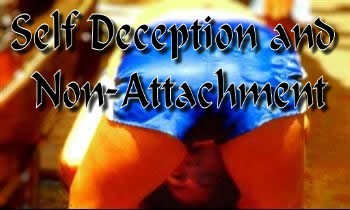
I got another question, and boy do I love ‘em.
You wrote about forgiveness at my request and you linked to the idea of letting go and the act of ‘putting it down’. That was awesome because putting it down is more doable than letting it go, for me. Loved it. Similar to the idea of letting it be. I just appreciated your idea of putting it down. So… what do you find as the difference and similarity between forgiveness and surrender?
It’s not about forgiveness, or about surrender. It’s about semantics vs. acting.
See, here’s the thing. People use the endless analysis of words and concepts to justify staying stuck. They endlessly look for the right description or descriptor, and that seems to them to actually be doing something.
The story we tell ourselves, the words we use to describe ourselves, are convenient fictions. Acting differently, on the other hand, is hard.
Another friend just wrote to me. She’s in the throes of a spring romance. The guy seems to be (haven’t met him; just have her descriptions) interested in dialogue and honesty. This is something she has never had before, although she swears it’s what she wants.
He’s asked her probing personal questions designed to deepen the relationship. She remains mute — which was her problem in the past.
Her dilemma? “Since I’ve never had a relationship where I communicated, how can I communicate?”
Now, she’s been to The Haven and learned their Communication Model, and has learned from me how to be honest. I’m sure, though, she’d argue that those things were just practice, and this is real!
So, what’s going on here?
She, like my friend who asked the opening question, wants to stay stuck, because shifting things is hard work.
Back to the first question — what, really, is the difference between “putting down” and “letting go?” Some might argue that, if I put something down, I can pick it up again, whereas letting go implies, well, letting go, permanently.
But really, dancing around on the semantics of there words begs the question: what are you willing to do differently, next time?
20 plus years ago, I had a major crisis on my hands (I wrote about it in the Deconstruction chapter of This Endless Moment 2nd. edition.) I was furious with a couple of people. My anger could have kept me a prisoner — I could have stayed stuck instead of moving on.
I don’t think I exactly planned it, but every morning for 2 years, as I had my morning shower, I’d let myself “pick up” or dwell on what I was angering myself over. I’d yell, cry, whatever. And I made a deal with myself. I’d do it until I didn’t need to anymore.
The other part of the deal was: when I got to towelling off, I’d calm myself ad drop my drama.
So, that’s what I did. for about 2 years. The rest of the time, I got on with living my life in the most elegant way I could.
“How can I talk to someone when I’ve never done that before” is kind of a silly question. You learn to talk to someone by… wait for it… talking to someone!
I’ve never met a natural communicator — someone who just knows how to, and does — good communication.
One woman we knew had taken tons of Haven courses, and yet, when she upset herself, she’d run around screaming and acting all hysterical. We’d have to wait for her to calm herself down — Then, we’d talk.
Darbella tended toward curling up in a ball when confronted with a sticky issue, whereas I tend to bluster, pout, and sulk. Needless to say, if we let our “normal, learned behaviour” run amok, we’d have lasted 35 seconds as opposed to 35 years.
Forgiveness and Surrender
As to the opening question’s ending sentence, both of these things are just semantics. Forgiveness is a self-directed act of stopping yourself from blaming, because when you don’t “forgive,” the only one who gets hurt is you.
Surrender is a loaded term, and gets confused with being forced to yield. We can loop down a rabbit hole with it. Surrender what, to whom, why? Seems like a good word to get yourself stuck — and guess what? The end result is non-action.
So, I choose the word non-attachment for all of this.
And what am I non-attached to? In this context, I’m non-attached to my stories, my evasions, and my unwillingness to act differently.
In other words, I recognise that what I do is who I am. Notice I did NOT say, “Who I say I am…”
No one is their story. Everyone is their behaviour.
Of course, the next thing out of people’s mouths is: “It’s not fair! Other people act like assholes and I’m just supposed to give in?” That’s not what I’m saying.
The non-attached person accepts that others will act as they act. Getting hooked into (attaching to) their behaviour, and then choosing to act stupidly in response is how one screws up. Royally.
The non-attached person has their feelings, but has them safely… perhaps for years, while showering
May 12, 2017
On Being Whole
On Being Whole — it’s natural to segment ourselves, but that doesn’t make it helpful. Some ideas on wholeness.
Would you consider writing an article on how we can balance the spiritual side of our lives with the everyday mundane world of making a living? In other words — a blending of the two that allows use to combine both in to living a more fulfilling life?
Why, sure!
 No judgement — it’s all the same thing — just don’t sleep through it
No judgement — it’s all the same thing — just don’t sleep through itThe short answer is, the issue goes away when you stop thinking of the two as different or mutually exclusive.
Here’s the long answer.
In the West, several hundred years ago, during the “Enlightenment,” (a joke, because not many seem all that enlightened,) both knowledge and “life” got divided. Prior to the Enlightenment, “the Religious,” (and especially Doctors of Theology) were the only ones educated enough to have “all the answers.” They had, by fiat, control of the bodies, minds and souls of the populace.
With the Enlightenment “Science,” came to the forefront, and we got Doctors of Science, and Doctors of Medicine. As the University gained more power, the Church lost some. (The initial reaction of the Church was simply to excommunicate those who proposed scientific theory that was seen as contradicting the Bible. If the person didn’t recant, they tossed ‘em to the Inquisition and declared ‘em heretics. Realizing belatedly that scientific theory was actually verifiable, frying, boiling, flaying and disembowelling became less the preferred method for the Church to express displeasure. The Church, methinks, has much to account for…)
Ultimately, the Church opted to carve things up into sacred and secular. They gave “body and mind” to the Doctors, “the secular world” to the Scientists and “the sacred and the soul” … well, they kept that for themselves. Back then, the Church pretended that they alone possessed the keys to the kingdom, so the general populace (and fearful scientists) considered the Church to be the arbiter of “the ultimate” — this being accomplished not by logic, but through fear of excommunication.
“The Church” carries much less weight in most circles these days, but the detritus of the past is this — people have trouble dropping the artificial distinction between “spiritual and mundane.”
This practice of carving things up to better understand them is a distinctly Western practice. We have created smaller and smaller areas of expertise. A friend of ours did her PhD. in whale genetics. She was able to figure out the mitochondrial DNA relationship structure within different pods of Wright whales, something no one else had been able to do. When she presented her dissertation, there were several hang-ups, not the least of which was that there were only 2 whale geneticists in the world who could be trusted to figure out whether her “markers worked.” Geez, not even enough for a bridge game (unless you invite a whale.)
As a former member of the clergy, I know how the game is played. I remember thinking that only clergy could do certain things. I felt a calling (notice the language – called into service, ordained, set apart, etc.) to “be of service,” and I believed that call to be from God. So, I had to go to seminary, get ordained and don the outfit.
 The “mad monk” ca. 1983
The “mad monk” ca. 1983It took me until I was 45 to build up sufficient steam to leave, never to return. But I had blown off the “division of knowledge” baloney a decade earlier, and I invite you to do the same.
Consider this: in the West, why does there seem to be a short list of “spiritual things” and a long list of the supposedly secular or mundane? I think that part of the answer is that, in the West, we are human do-ings as opposed to human be-ings.
I remember being in the midst of my 2-year Masters in counselling and going to my supervisor with a question about doing excellent therapy. She sighed and shook her head and said, “You don’t do it, you be it.”
To learn that lesson meant to let go (at that point) of 31 years of conditioning.
Our culture tells us that we “do” spiritual things in “spiritual places” and in prescribed “spiritual ways.” This jibes with the notion that our bodies are at war with our spirits, that sexuality is un-spiritual, that there are “cleans & dirties” and that our secular work is “filthy lucre” — at best, it provides the money to fund the real, spiritual, important stuff.
So, if you want to see a way around this, here it is. Enact your spirituality in everything you do. Stop carving up your life into compartments. Work on seeing all of life as lush with spirit and soul.
This is captured in the Zen and Buddhist and Taoist idea, “chop wood, carry water.”
If I choose to engage with my tasks and with the people I come into contact with in a full, deep, honest, and “soulful” manner, how could this not be described as practicing my spirituality in the world? If I make the other choice, then I am cutting myself off from my roots for most of my week, just showing up and doing my job, putting in time and wasting my life. And then trying to make up for it with some church here, some prayer there and a little meditation in the morning to help me survive another day of the life I have chosen for myself.
Because here’s the kicker: no one makes us do the job we do. The “I have no choice, I have to work and this is the only job I can do” is simply crap.
I, and only I, decide who I am relationship with (and how) and what I do and how I spend the 24 hours per day I’m given. If I choose to bore myself, anger myself, just put in time, or otherwise fart around with that time, I need only look in the mirror to see who is causing my distress.
I remember back fondly to the original run of Kung Fu, with David Carradine. This was, for many people, a first, somewhat Westernized look at Eastern thought. What I loved most was watching Kwai Chang Caine enter a town, and immediately get a job. Now, remember, he’s a Shaolin Priest. Yet there he is, week after week, “chopping wood, carrying water.” And not getting fired, not sleeping on the job, and emphatically not griping about the workload. He just shows up and does his job, and in that process is afforded opportunities to “be of service.”
And that may be what we all need to be: Eastern Westerners/Western Easterners.
This week, look at the compartments you artificially create in your life. If you hate your job, get some training or just go do something else. What, you think you have forever? Or if you are making yourself miserable over aspects of your job, change your attitude.
If you think there is a separation of “worlds” that keep you from being who you are, get over this thought.
If you think that there are no lessons to be learned and no light to be shed on the situations and the activities of your life, give your head a shake. And if you are disregarding your body, your sexuality, your eroticism, your humour – because you think parts of you are un-spiritual, give your whole self a shake.
And then, chop wood, carry water. Celebrate your life and your body as a unified whole.
Because any other story is fragmentary, at best.
May 6, 2017
What’s Your Libretto?
What’s Your Libretto? — everything we believe comes through the filter of other people. Just like a libretto.
Many moons ago, Darbella and I became enamoured with Tom Robbins. His books are always on target, and his sense of humour is like ours. We read several of his nooks, then downloaded audio-books to entertain us on long drives.
I was recently reminded of a quote from Robbins’ book, Half Asleep in Frog Pajamas:

Sarah Bernhardt was such a powerfully popular, awe-inspiring actress that when she toured in North America her performances invariably sold out, even though she spoke hardly a word of English. Whatever play she did, Shakespeare, Moiré, Marlowe or whatever, she did in French, a language few nineteenth century Americans could comprehend. Theatergoers were provided with librettos so they might follow the action in English. Well, on at least a couple of occasions, ushers passed out the wrong libretto, a text for an entirely different drama than the one that was being staged. Yet, from all reports, not once did a single soul in those capacity crowds ever comment or complain. Furthermore, no critic ever mentioned the discrepancy in his or her review.
We modern human beings are looking at life, trying to make some sense of it, observing a “reality” that often seems to be unfolding in a foreign tongue – only we’ve all been issued with the wrong librettos. For a text we’re given the Bible. Or the Talmud or the Koran. We’re given Time magazine and Reader’s Digest, daily papers and the six o’clock news; we’re given school books, sitcoms and revisionist histories; we’re given psychological counseling, cults, workshops, advertisements, sales pitches, and authoritative pronouncements by pundits, sold-out scientists, political activists, and heads of state. Unfortunately, none of these translations bears more than a faint resemblance to what is transpiring in the true theater of existence, and most of them are dangerously misleading. We’re attempting to comprehend the spiraling intricacies of a magnificently complex tragi-comedy with librettos that describe barroom melodramas or kindergarten skits. (pp. 116–117)
Needless to say, Robbins’ words from 1994 ring true today, when much of what we read is “false news.” And I mean all of it, from both sides of the aisle, so to speak.
We are force-fed propaganda that is scientifically designed to “get to us.” It’s one or several steps removed from reality, however, as reality is, well, right here, right now.
But back to Robbins, and librettos.
First of all, I can’t say loudly enough how much I love Tom Robbins. Way back in July of 2002, I wrote 2 articles looking at quotes from “Even Cowgirls Get the Blues” (start here.) I’ve even provided click-through links to Amazon. I also wrote about a quote from “Fierce Invalids Home From Hot Climates,” (start here)
Anyway, Robbins is an amazingly well read and articulate writer, with a real gift for the language. And the libretto piece, which I quoted, above, is brilliant. IMHO
Librettos are handy tools used in theatre and opera — they’re used to translate foreign languages, so you can follow along, say, with an Italian opera. They are, in other words, the Cliff Notes for the performance.
Robbins argues that there is no way to check the validity of the “Notes” without understanding the underlying language. That was the point about audiences being given the wrong libretto, and no one noticing.
And even if you know the underlying language, words can be ambiguous, so you “picks your translation and you takes your chances.”
For example, “Born Again Christians” take their name and approach from the English translation of a text where Jesus supposedly says to Nicodemus, “You must be born again.” However, that text originally was written in Greek, and the word translated “again” is anothen. This word can be translated either “again,” or “from above.” From that simple translation complexity, a whole religious perspective has emerged.
 the schism
the schismIt reminds me of a scene in Monty Python’s movie “Life of Brian,” — Brian, escaping the crowd, drops a sandal.
The crowd screeches to a halt, and stares at the dropped shoe. A furious debate breaks out, and the first “Church of Brian” schism occurs, over the meaning of the dropped shoe. (Here’s the script
April 22, 2017
Thoughts on Letting Go
Synopsis: Thoughts on Letting Go — letting go is all about learning what you can control, and what you can’t. And not whining about it.
Looking for more to read on this topic? Check out Wayne’s book, This Endless Moment 2nd. edition

Recently I found a series of quotes from Susan Campbell, a California therapist and trainer. Susan used to work with Ben & Jock, back in the “old days,” and had a hand in the creation of their Communication Model. Her “stuff” is quite elegant, and the quotes are thought-provoking.
I also found one from Darbella — one called “Let Go.”
to “let go” does not mean to stop caring; it means I can’t do it for someone else.
to “let go” is not to cut myself off; it’s the realization I can’t control another.
to “let go” is not to enable, but to allow learning from natural consequences.
to “let go” is to admit powerlessness, which mean the outcome is not in my hands.
to “let go” is not to try to change or blame another; it’s to make the most of myself.
to “let go” is not to care for, but to care about.
to “let go” is not to fix, but to be supportive
.to “let go” is not to judge, but to allow another to be a human being.
to “let go” is not to be in the middle arranging all the outcomes, but to allow others to affect their own destinies.
to “let go” is not to be protective, but to permit another to face reality.
to “let go” is not to deny, but to accept.
to “let go” is not to nag, scold or argue but instead to search out my own shortcomings and correct them.
to “let go” is not to adjust everything to my desires, but to take each day as it comes and cherish myself in it.
to “let go” is not to criticize and regulate anybody, but to try to become what I dream I can be.
to “let go” is not to regret the past, but to grow and live for the future.to “let go” is to fear less and love more.
~~~ Thomas Allender, S.J. ~~~
And here’s a Susan Campbell quote:
“Basing our self-esteem on the ability to control people and events actually keeps us feeling out of control.”
All of this is really about control.
And coupled with that are other buzzwords: powerlessness, “can’t control another,” “not to fix,” outcomes, regulate.
One of the goals of therapy is helping people to learn the difference between what is possible to control and what is not. The best way to do this is to introduce them to their own skin, so that they start working only within that wrapper.
Here’s a “truth” for you, which explains why we need a list about “letting Go.”
When people attempt to “control” — attempt to exert influence either on the world around them or on the others who occupy the world — they do so to push back our fear of irrelevance, meaninglessness and death.
This is not to say that we admit to our games. No, we point fingers; we blame:
“But… but… it’s my (marriage, business, relationship, job, family) and I “should” be able to control what happens!”
“But… but… I’m special! Everyone knows how special I am, and if they don’t, they should! If they really loved me, they’d want to make me happy by doing it my way!”
“But… but… I’m here for a higher purpose! Why is the world thwarting me? I’m only trying to make it better for everyone!”
In other words — we lie, we deny, we cheat, we play manipulation games, we pout, we whine — and boy do we complain, all because the world will not cooperate in our attempt to get others to give our lives meaning. What we conveniently forget is that all the other people in our lives also have lives, and want us to give priority and meaning to theirs.
Everyone is “Waiting for Godot” to come along and make it all better. Life will be fun and things will get done, when all the external ducks line up and stay that way. And we wait… and we wait.
And then we die.
The key to the list and to the Campbell quote is external vs. internal control. External always requires the cooperation of another thing or person. Internal is where I have a modicum of control. I can look at my methods of interpretation and my actions, notice which ones are working for me and which ones aren’t — and I can “work” on the ones that aren’t. Any other route is a sure path to disaster.
To assume that I am here to “make” other adults behave according to my pre-conceived notions of how they should behave is both arrogant and naïve. If I assume that other adults should put my needs ahead of theirs, either because I am more powerful or more needy than them (more special) then I am both egotistical and foolish.
Paradoxically, however, unless I retreat to a cave, all of my actions and life are lived both “in here” and “out there.”
The question, then, is not an either/or one, but rather a question of how. For me, I see the approach that works as:
“A rigorous, self-responsible, self-discipline coupled with honest communication and a willingness to let others be equally self-responsibly self-disciplined.”
To let go in many respects means to get out of the way.
Self-esteem is an “inside job.” I am free to express my opinions, attempt to influence situations and others, and to state consequences for “failure to perform.” If, for example, I am someone’s boss, I have the right to expect a certain level of performance from an employee, and have the right to fire him or her for non-performance.
But here’s the key: I am silly if I connect my feelings of self worth to another’s compliance .
To go back to my internal vs. external comment: what we’re talking about is the acknowledgement that my internal representations of the world are just that — mine. As we look at the “Let Go” list, we see that what is being proposed is another frame of reference.
The “old” frame is all about treating others, (as one of the points says,) as “things” to be fixed. This “old” frame of reference can be restated,
“I know better than that object over there how it should function in the world.”
Now, if I am talking about a refrigerator, in general I do know better than the refrigerator what it ought to be doing. I once remember having a refrigerator in an apartment that got stuck on defrost. When I opened the door, everything had melted and liquids were well over 100 degrees F. Pop bottles had “popped.” There was oozing stuff everywhere. Needless to say, I didn’t go, “Well, I thought a refrigerator was supposed to keep things cool, but hey, obviously this one has other plans and knows what it is doing.”
On the other hand, I know a lot of people who would turn to their partner and scream, “What did you do to break the refrigerator?” But I sort of digress, again.
A more viable frame of reference is to remember that people are not objects.
Have a look, again, at the list above, about letting go of the need to fix others to fit your erroneous representations of how they should be. Let go. Work on you. People aren’t refrigerators, and they aren’t roles. They’re autonomous human beings.
Keep to your own package, your own skin. God knows there’s enough to do in there for a lifetime.
The post Thoughts on Letting Go appeared first on The Pathless Path.
Original article: Thoughts on Letting Go.
April 14, 2017
Relating — it takes two to tango
Relating — it takes two to tango — relating is an individual game played in pairs. No relationships — just relating
Of Wayne’s many books, the one closest to today’s topic is: Half Asleep in the Buddha Hall
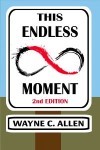 Click image for more info!
Click image for more info!The 2nd. edition of This Endless Moment is now available from Amazon.
The new version has 100 plus more pages of insights and helps.
You’ll discover the resources you need for living a centered, fulfilled, and aware life.
The paperback version is here:This Endless Moment 2nd. edition
The kindle version is here:This Endless Moment 2nd. edition

I want to say a bit about relating, the fallacy of romance, and about what I see as the point of relating.
Tom Robbins, in an odd, handwritten ending to Still Life With Woodpecker,
writes (literally…)
When the mystery of the connection goes, love goes. This suggests that it isn’t love that is so important to us but the mystery itself. The love connection may be merely a device to put us in contact with the mystery, and we long for the love to last so that the ecstasy of being near the mystery will last. It is contrary to the nature of mystery to stand still. Yet it’s always there, somewhere, a world on the other side of the mirror… a promise in the next pair of eyes that smile at us. We glimpse it when we stand still.
The romance of new love, the romance of solitude, the romance of objecthood, the romance of ancient pyramids and distant stars are means of making contact with the mystery. When it comes to perpetuating it, however, I got no advice. But I can and will remind you of two of the most important facts I know: (1 ) Everything is part of it. (2) It’s never too late to have a happy childhood. pp 274–6
Robbins writes that mystery is a key reason to be in relationship. He is quick to go on, and in his going on, to avoid describing the mystery.
While this may seem unsatisfying, one can’t explain a mystery, as explaining means it’s no longer mysterious. It’s like watching an excellently crafted mystery movie. Once you’ve seen the ending, you may watch it again, but it will never have the impact of the first watching.
So all we can say, really, is that the mysterious is unknown and therefore a bit (or a lot) fear-inducing. And the mystery of “me” — of myself — is the greatest mystery of all — but only to me. (If I’m stupid enough to think that anyone else will sufficiently value my mystery as to make it more important than their own, I deserve whatever I get. And this, I believe, is the stupid belief most responsible for the breakdown of relationships.)
That being said, I don’t want to leave you with the idea that I am anti-romantic, anti-love, or anti-falling in love. I am fervently “pro” all of these.
What I stress, again and again, is that the warm and gushy feeling of love, like horniness, is a transitory, fun state, indicative of my ability to fall in love. It’s not the basis of anything, nor is it ever about the other person.
I still get all gooey inside when I see Darbella, and that’s after 34 years. It just doesn’t mean anything — other than that I tell myself all kinds of pleasant stories about Dar that continue to cause me to, in a sense, “make myself melt.”
If it were the other way – if it were all about Dar, then I would be justified in blaming her when I choose not to feel “melt-y.” And that would erroneously lead to my expectation that she needs to do something to “fix me.”
Once I “get” that I choose how I feel about Darbella,
I can take responsibility for those choices and feelings.
Simple as that.
One aspect of the mysterious nature of life is that, even in a crowd, we are alone, and therefore many people form relationships not for their intrinsic value, but rather so as not to feel alone. But… being alone is our natural (if uncomfortable) state — so if we believe it is our partner’s job to “make us” feel “not alone,” trouble is looming on the horizon.
In a sense, wisdom comes when we accept relating is about “being alone together,” or being alone but not lonely.
Another part of the mystery is that relating does not create a new thing. Someone might say, “We really need to communicate better.” I, tongue in cheek, will ask him/her/them to show me the “we.” They fidget, and then accuse me of splitting hairs. I’m not.
There is no we. There are just two people, relating (either well or poorly). There are not two people AND a relationship. This is important, and beyond semantics.
“We really need to communicate better,” is a “mom and apple pie, universal statement.” I mean, who could disagree? And yet, like all universal statements, no one has committed to taking responsibility for actually doing anything. Why? Because there is no “we” that can communicate better.
Now, if one says, “I’m unhappy with how I am communicating, and here’s what I’m going to do differently,” we begin to see the possibility of change.
Another untrue universal is that people in relationship should be selfless. Even when practiced perfectly, the wheels are a little flat on this car.
I once worked with a couple; the wife was very ill, and was going to die soon. He told me he was being strong for her, and she said she was continuing medical interventions because he wanted her to.
I asked them about their feelings of sadness and hope and despair and love. All of the “medical intervention” conversation stopped. They both expressed a desire to go away together for a while. I kept getting this hit of deep sadness from him, and encouraged him to express it.
As he expressed some of his sadness, she rubbed his shoulder, smiled and said, “I know. It’s OK.”
When both started to think of and express themselves, the relationship between them deepened. They then shared themselves with intimacy and vulnerability.
Another strange thing — people in dysfunctional relationships berate their partners for “not accepting me just as I am.” It’s a strange demand, because I’ve never met anyone who asks for total acceptance and also unconditionally accepts his or her partner the way he or she is.
I mean, it’s contained in the quoted statement. If the person were living up to this ridiculous idea, she would have to say, “I completely accept my partner’s inability to accept me as I am, because I unconditionally accept him as he is.”
No, people shovel this bilge because they don’t wan to go through the bother of controlling themselves.
Those of you that know me know that I can shift into “arrogant 6-year-old,” and still do so semi-regularly. Darbella accepts this shifting in me — she knows that I do it, and she doesn’t choose to get her shorts in a knot over it.
However, and it’s a big however, she also expects that I will notice when I am doing it, not make it about her, and get over myself as quickly as I can. If for some reason I don’t notice, she’ll be glad to point it out to me.
And of course Dar has her quirks, and is quite good at snapping herself out of them.
You could say that I accept Dar as she is, and she me. But this is only possible because both of us agree to be self-responsible for stopping ourselves when we’re acting like children or idiots. And that we know that our partner will point it out if we don’t stop ourselves — not out of obligation or to punish, but to remind the other that they need to get themselves back under their own control, instead of whining about how “I just can’t help myself.”
Relating is a game of choosing someone to live with in the here and now . Someone knows me (at least as much as I have revealed) and vice versa, and chooses to hang around anyway. I have someone to self-explore with, to have fun with, to have tears with, to live with, to love. And vice versa.
Is it always mushy and gooey? No. Is this relating boring and mundane? Sometimes. (Just like me
April 7, 2017
Clearing out the Garbage
Synopsis: Clearing out the Garbage — our minds are repositories of an incredible amount of crud — garbage. Maybe it’s time for a Spring Cleaning!
Of Wayne’s many books, the one closest to today’s topic is: Half Asleep in the Buddha Hall
 Click image for more info!
Click image for more info!The 2nd. edition of This Endless Moment is now available from Amazon.
The new version has 100 plus more pages of insights and helps.
You’ll discover the resources you need for living a centered, fulfilled, and aware life.
The paperback version is here:This Endless Moment 2nd. edition
The kindle version is here:This Endless Moment 2nd. edition
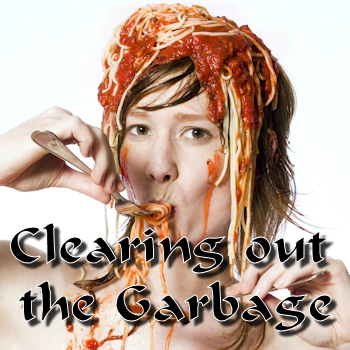 What a Mess!!!
What a Mess!!!
Do not believe in anything simply because you have heard it. Do not believe in anything simply because it is spoken and rumored by many. Do not believe in anything simply because it is found written in your religious books. Do not believe in anything merely on the authority of your teachers and elders. Do not believe in traditions because they have been handed down for many generations. But after observation and analysis, when you find that anything agrees with reason and is conducive to the good and benefit of one and all, then accept it and live up to it.
~ Buddha
~~~~~~~~~~~~~~~~~~~~~~~~~~~~~~~~~~~
This is the situation of your head: I see cycle-handles and pedals and strange things that you have gathered from everywhere. Such a small head…and no space to live in! And that rubbish goes on moving in your head; your head goes on spinning and weaving — it keeps you occupied.
Just think what kind of thoughts go on inside your mind. One day just sit, close your doors, and write down for half an hour whatsoever is passing in your mind, and you will understand what I mean and you will be surprised what goes on inside your mind. It remains in the background, it is constantly there, it surrounds you like a cloud. With this cloud you cannot know reality; you cannot attain to spiritual perception.
This cloud has to be dropped. And it is just with your decision to drop it that it will disappear. You are clinging to it — the cloud is not interested in you, remember it.
~OSHO The Sun Rises in the Evening Chapter 9
I was catching up with a friend recently, and she said that:
She had been off work for a couple of months, with a bad back.
She had ended her marriage 2 years ago, and “dealt with it” by throwing herself into her job.
She is teary, but was brought up not to cry and never to get angry.
She will turn 40 in a month or so.
I looked her up and down, and said, “Lots of tension in your jaw. Seems like you don’t believe it’s OK to say what needs to be said, and you bite off your emotions.” She agreed, startled.
I continued, “Your back problem — is it at L5?” She agreed, now getting a bit pale.
I finished: “Now, tell me what’s wrong with your bowels.” In a quiet voice, she said: “I’ve developed spastic bowel. How do you know all of this?”
Those of you who have read the Bodywork section of the website will know the answer to that question. According to Bodywork theory, the lower back, bowel area is “all about” unresolved, unsatisfying relationships.
Now, get this: not all lower back pain is about relationships, but most relationship difficulties “become physical pain” in that region. Can you see the difference?
I’m using this as an illustration of the opening quotes from the Buddha and OSHO. The message is that we have many ways of not quite “getting” what is going on in our lives.
The Buddha quote is about how our heads get filled with rules and regulations and religions and philosophies, so that there is no room for observation and analysis (understanding.)
OSHO cuts to the chase, and says that our heads are full of rubbish — crap — and that our moronic meanderings that lead precisely nowhere.
Far from tidy, our brains are a mess. Doing mind-work is like endlessly spending time sifting through the junk in an overflowing attic.
I amaze myself at how many people practically swoon at the idea of weeding out their attic. I continually listen to people describing miserable existences and lousy relationships, and then they line up a truck-load of excuses for keeping their belief system intact — the very same belief system that got them in the mess in the first place.
And, of course, they want the “special exemption,” as in, “You don’t understand. My situation is different! There’s no way I can change it.”
My friend from the illustration, is typical.
She spent a miserable decade married to someone she quickly realized had been a poor choice, yet she stayed because society told her to. And her mother did the, “You made your bed” bit, so no support there. She finally left, and rather than deal with the pain of failure and the pain of realizing how badly she sucked at relationships, she threw herself into work. Same pattern with every other significant disappointment in her life. Lots of unresolved issues and pain, buried under her work-load.
I believe our body/mind/spirits are well designed, and continually nudge us toward letting go of our crap and finding a path to walk that leads to understanding. In general, the nudge we receive is in the form of a quiet voice, which is why Zen teaches Zazen (simple sitting) as a way of clearing the mind long enough for the quiet voice to speak.
One of my favourite Bible verses, from 1 Kings 19, speaks to this. Elijah, as he hides in a cave trying to escape his past, wants a meeting with God (to gripe and complain, of course, about how tough his life is).
Here’s the text:
9 And the word of the LORD came to him: “What are you doing here, Elijah?”
10 He replied, “I have been very zealous for the LORD God Almighty. The Israelites have rejected your covenant, broken down your altars, and put your prophets to death with the sword. I am the only one left, and now they are trying to kill me too.”
11 The LORD said, “Go out and stand on the mountain in the presence of the LORD, for the LORD is about to pass by.” Then a great and powerful wind tore the mountains apart and shattered the rocks before the LORD, but the LORD was not in the wind. After the wind there was an earthquake, but the LORD was not in the earthquake.
12 After the earthquake came a fire, but the LORD was not in the fire. And after the fire came a gentle whisper.
13 When Elijah heard it, he pulled his cloak over his face and went out and stood at the mouth of the cave. Then a voice said to him, “What are you doing here, Elijah?”
God, (*grin*) I love that question!!!
You see the pattern? Back story: Elijah had been going around doing what he considered to be “god’s work,” and it was going well. Then, he runs into opposition, and he crumbles like a house of cards, then runs for the hills. There, in a dark and dank cave, he complains and whines and wants to die.
God shows up, not dramatically, not in an earthquake, wind or fire, but in a gentle whisper.
He tells Elijah to pick himself up and get back to work.
Because… why hide?
There’s no place to run to, no place to hide.
All you can do is quiet the tumult inside your head
and listen for the whisper.
So, what happens if you “don’t wanna?” (Winge. Whine.) Your body gets involved.
Aches and pains, heartburn and heartache, so to speak. Things you “can’t stomach” keep happening, and your belly hurts. Shit you refuse to deal with backs up and turns to spastic bowel. And if that doesn’t get your attention, you’ll get really sick.
Because that little, quiet voice really, really wants your attention.
Now, this is not to say you can’t ignore all of this and go numb and deny the issue and confuse yourself and live with the pain and sickness and despair and hurt. Of course you can, and many of you are.
All I’m saying is you don’t have to.
OSHO says you can stop all of this by simply choosing to drop the cloud of confusion, noise and game playing. I would add that this “dropping” happens “again and again and again.” One step and one step and one step.
This week, try what OSHO suggested. Sit for a half hour and write down or record every thought that crosses your mind. If you’re not convinced at the end of the time that your attic is full of total garbage, maybe you should be writing The Pathless Path.
If you want to do things differently, find a good Therapist and a Bodyworker, and get going on with the attic cleaning.
It’s not going to be easier tomorrow. Do it today!
The post Clearing out the Garbage appeared first on The Pathless Path.
Original article: Clearing out the Garbage.
March 31, 2017
The Problem with Mind Boxes
Synopsis: The Problem with Mind Boxes — mind boxes are convenient storage-places for data, and make living easy. Beware, however, making the contents “true.”
For more info on today’s topic, see: This Endless Moment 2nd. edition
 Click image for more info!
Click image for more info!The 2nd. edition of This Endless Moment is now available from Amazon.
The new version has 100 plus more pages of insights and helps.
You’ll discover the resources you need for living a centered, fulfilled, and aware life.
The paperback version is here:This Endless Moment 2nd. edition
The kindle version is here:This Endless Moment 2nd. edition
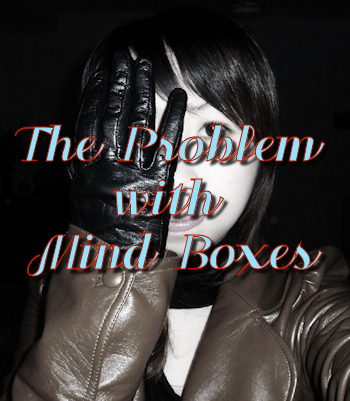
A Question about Mind Boxes
Thanks for the (as always) excellent reminders.
I would be interested in your viewpoint on this question:
When we are born into the human form, with the human brain and it’s abilities, does that not predispose us to the mental gyrations we use throughout life, to one degree or another.
On the surface, the brain seems to be the one thing we ‘battle’ in this life, without end.
March 25, 2017
Another Look at Emptiness
Another Look at Emptiness — a Western look at emptiness, and how different categories of “knowing” affect us
Looking for more to read on this topic? Check out Wayne’s book, This Endless Moment 2nd. edition
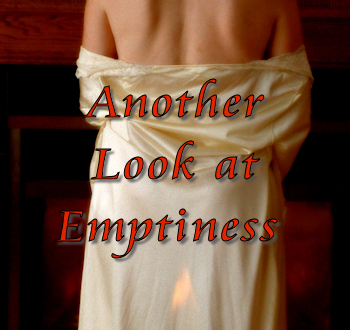
Many of the themes I write about on The Pathless Path revolve around the idea of emptiness, but one of the tricky parts about emptiness is that many Westerners equate emptiness with “meaningless.”
People think that to be empty is to lack feeling, empathy, and involvement. Now, of course, most people who say that are typically narcissists who have trouble with not being the centre of attention, so I guess that explains some of it.



